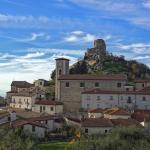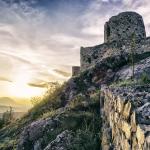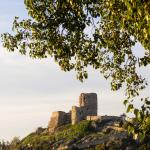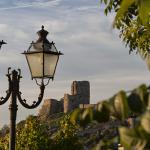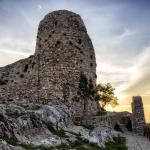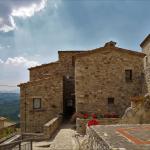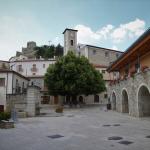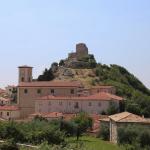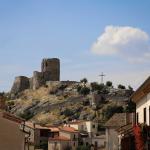The Municipality of Rocca San Felice is located in the Upper Irpinia area. It's a village of 843 inhabitants, located 750 meters above sea level and 52 km from Avellino. The territory extends for 14.41 sq km and the neighbouring municipalities are: Frigento, Guardia Lombardi, Sant'Angelo dei Lombardi, Sturno and Villamaina.
The etymology of the name could come from the conformation of the place itself, from which "rocca" is understood as a hill or citadel, while the specification "San Felice" reflects the cult for the patron saint. The inhabitants are called Rocchesi and Saint Felix is their patron saint.
PLACES OF INTEREST
- Geosite of Mefite in the Ansanto Valley - Area among the most anciently inhabited in Irpinia, a place of pilgrimage since the 7th century BC, due to the presence of the goddess Mefitis, a divinity to whom a sanctuary was dedicated at the sulphurous lake which, still today, boils
- Castle of Rocca San Felice - Particularly impressive, it rises 750 meters above sea level and represented the end of a fortified area up to the top of the village
- Church of Santa Maria Maggiore (Saint Mary Major) - Religious building dating back to the 12th century with an imposing bell tower
- Sanctuary of Santa Felicita - Among the oldest religious buildings in Irpinia, since 2018 it has become a diocesan sanctuary
- Chapel of Maria SS. di Costantinopoli (Our Lady of Constantinople) - It houses a painting of Our Lady of Constantinople with the Child
- Civic Museum Don Nicola Gambino - It collects the artefacts found in the most recent archaeological research
- Exhibition of Ceramics - Exhibition of pottery and pottery fragments
- Historic Centre - Characteristic type of medieval settlement, with narrow alleys, portals, exposed stone and stairways
- Piazza San Felice - Adorned by the secular lime tree, the monumental fountain, the arches and the loggia of De Laurentis-Villani Palace and by "re muredde", a series of stairways leading to via Castello
- Historical Palaces - De Renzis Palace, Marchesa Rossi Palace, Ludovisi Palace, Santoli Palace
EVENTS
- Medieval Festival - Summer event that takes place throughout the historic centre and is a real dive into the past, at the time of the Middle Ages, with strollers and jugglers, ladies and knights, hosts and merchants, magicians and sorcerers
- Festival of the Courtyards - Event with ancient music, food and wine tastings and straw bonfires
- Saint Felix Feast - Celebrations dedicated to the patron saint
- Fair of Saint Felicitas - Fair that usually falls in the period of the month of July
TYPICAL FOOD AND PRODUCTS
- Pecorino di Carmasciano PAT - Sheep cheese produced in the locality of the same name located between Guardia Lombardi and Rocca San Felice: with an absolutely unique taste, it is characterized by an accurate, entirely artisanal preparation
- Carmasciano lamb PAT - Fresh meat of lambs of the Laticauda and Bagnolese breeds, carefully reared using herbs and hay enriched with the sulphurous exhalations of Mefite
- Ricotta di Carmasciano PAT - White, with a soft and creamy consistency, obtained from the residual whey from the processing of the homonymous pecorino, very valuable
- Caciocavallo Silano PDO - Semi-hard cheese, with spun curd, produced with milk from different breeds of cows, including Podolica
- Caciocavallo irpino di grotta PAT - Spun curd cheese, produced with milk from small and medium-sized farms, mainly from brown cattle, traditionally aged in caves
FUN FACTS
For Cicero, Mefite was the "Mouth of Hell"; the goddess was greatly revered by the female universe, as a protector of fertility and women to the point that a temple was built in her name, near the sulphurous lake.
Moreover, the Ansanto Valley is mentioned in the seventh canto of Virgil's Aeneid: "Est locus Italiae medio sub montibus altis nobilis et fama multis memoratus in oris, ampsanctis valles", i.e.: “There is a place in the centre of Italy surrounded by tall mountains, famous and well-known anywhere in the world: the valley of Ansanto".
There's a famous legend about the Rocca San Felice Castle, of a ghost who wanders dressed in white. The woman is desperately looking for her beloved husband, crying for her difficult fate and that of her husband and her children, deprived of the throne and bound in the ancient prison. The woman is Margaret, wife of Henry II of Swabia, son of the Holy Roman Emperor, Frederick II.
HISTORICAL NOTES
Rocca San Felice has very ancient origins, dating back to the presence, in pre-Roman times, of a temple dedicated to the goddess Mefitis, in the Ansanto Valley.
The current village arose in medieval times, more precisely in 848, when, with the establishment of the Principalities of Salerno and Benevento, King Ludovico decided to give life to the fortress of Rocca to delimit the boundaries between the two territories.
In the Angevin period, the village was incorporated into the fiefdoms of the D'Aquino family. Subsequently, it was administered by the Saraceno, the Caracciolo, the Reale and the Capobianco, lords of Carife, who held the property until 1806, the year of subversion of feudalism.
Rocca San Felice is an invitation to taste the wild heart of Irpinia with the inimitable flavour of sulphur, cloaked in the spell of the goddess Mefitis
Rocca San Felice
Via Don Vincenzo Maria Santoli, 1, 83050 Rocca San Felice AV, Italia
Featured places
Località Mefite, 83050 Rocca San Felice AV, Italia
A place of legendary fascination and with the rare geological phenomenon of gaseous fumes,…
Via Ospedale, 16, 83050 Rocca San Felice AV, Italia
Particularly magnificent, it stands at 750 meters above sea level and the main fortress, the…
Via Croce, 4, 83050 Rocca San Felice AV, Italia
A religious building dating back to the 12th century with a distinctive façade in local stone…
Did you like it? Leave a review
Your opinion is important! It will be visible after approval by the editorial staff.
To post a comment you must be an authenticated user. Log in with Social Login
